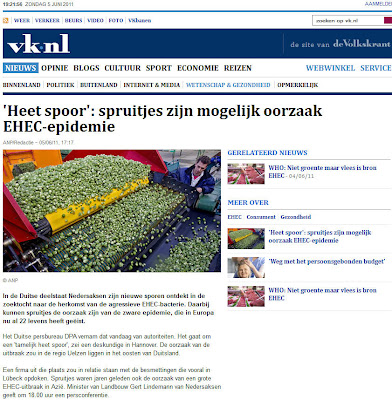EHEC ‘It Was 30 Days Of Hell’
U.S. E. Coli Victim said…
EHEC
In early May, John Meyer stayed at a lakeside hotel in Hamburg, Germany
He attended a business conference. He went sailing. And he became one of the few U.S. victims in one of the worst food poisoning outbreaks in recent world history.Meyer went to the hospital a week later with what turned out to be a rare and deadly strain of E. coli bacteria that caused thousands of illnesses, mostly in Germany. He would spend the next month in a Massachusetts hospital, much of the time in a delirium, while doctors worked around the clock to save his life.
Germany
Meyer is one of six U.S. cases linked to the German outbreak and he’s the first to talk about his terrible experience, speaking to The Associated Press by phone from his home in Franklin, Mass.”It was 30 days of hell,” said his wife, Loreen. Meyer was in Hamburg as that city was emerging as the epicenter of a food poisoning disaster that would be among the deadliest in memory. More than 4,000 people in Germany and other countries became ill since the outbreak was detected in May, including several hundred who developed a serious complication that can lead to kidney failure. At least 53 died.
Outbreak
The outbreak ultimately was traced to a batch of fenugreek seeds from Egypt.The seeds, which taste a bit like burnt sugar, are sometimes used as a spice in cooking. Fenugreek sprouts are used in salads. Meyer believes he must have eaten fenugreek while attending a business meeting at the Hamburg hotel. He thinks the tainted seeds, or sprouts, could have been in the fresh fruits and vegetables at a breakfast bar. There would be some irony if that was the case: It’s hard to find good produce during hurried business trips, and Meyer had welcomed the opportunity to eat healthy.
 |
| Bron: Volkskrant OnLine 5 juni 2011 (screenprint) |
“In this case, it backfired,” he said
Meyer’s lawyer provided the AP with lab results and government investigation reports into his illness. Massachusetts state health officials also confirmed he was infected with the rare German E. coli strain. Meyer declined to allow his doctor to speak to the AP and he would not agree to be photographed. Some common forms of food poisoning can cause symptoms within a day of eating tainted food, but Meyer said he felt no ill effects during a six-day European business trip that included two days in Hamburg and a brief stop in France afterward. He returned home on May 13 feeling fine.
Unique
However, this unique and dangerous E. coli bug takes a week to announce its presence. Meyer first became aware something was wrong on May 18. He was at his desk at Senior Aerospace that morning when his abdomen began hurting. At 52, he is a cyclist who eats two Greek yogurts each day. He says he’s never had food poisoning, but on that day he went home in pain. By midafternoon, he was hit with bloody diarrhea and a dawning sense of alarm. “Whatever it was, it wasn’t a minor thing,” Meyer said. His wife Loreen, a high school biology teacher, was home by then and worried. She took him to nearby Milford Regional Medical Center.
Rehydrate
Doctors there saw him quickly but weren’t able to diagnose him. They recommended follow-up with a gastroenterologist the next day and sent him home for the night. But when he got home the diarrhea accelerated. “Every hour, and then it started getting even closer,” he recalled. Loreen took him back to the hospital that night and he was admitted.Though it all happened less than two months ago, Meyer’s memory is fuzzy on what happened the next several weeks. He had intense stomach pain and his kidneys stopped working. Doctors put him on fluids to rehydrate him. They treated him with different antibiotics, and cleansed his blood using dialysis and other measures. The infection affected his mind. He recalled staring at a clock in his hospital room and not being able to tell time. “I was thinking, ‘Why do they have this strange clock in here, and why is it set up differently?'” Meyer said he grew paranoid, believing that his doctors had written him off for dead. Doctors had not given up on him, but were perplexed. A test for the most dangerous form of E. coli familiar to Americans came back negative. They sent specimens for additional analysis to lab with the Centers for Disease Control and Prevention lab in Atlanta.
In early June, CDC confirmed it was the German strain
Around that time, he had begun to recover. His kidneys were improving. His awareness returned. He was moved out of intensive care more than three weeks later, and on June 17 he was sent home. But he was far from normal. He and his wife said his muscles had atrophied, his red blood cell count was still down, and the lining of his colon had become a layer of dead tissue, unable to absorb nutrients. A man who had been an athletic 6-foot 2 and 185 pounds was down to 162 pounds and able to walk only short distances using a cane. He was hungry, though. Voracious, even, eating two breakfasts, two lunches and two dinners each day. “He had such a huge appetite because he was still not able to absorb as many nutrients,” his wife said.Now he’s up to 170 pounds and working part days from home. He’s been in physical therapy and regaining his strength, though he’s months away from the kind of vigorous exercise he used to do.Meyer and his wife contacted a local attorney, saying they were worried about possible problems with getting health insurance to pay his hospital bills. That turned out not to be an issue. But the attorney referred the couple to Bill Marler, a Seattle lawyer considered the nation’s pre-eminent plaintiff’s attorney in food poisoning cases.
Lawsuit
Marler is looking into the possibility of a lawsuit, with potential targets including the company that owns the Hamburg hotel where Meyer stayed. He called Meyer’s suffering “horrific,” and echoed Meyer’s wife in worrying that he may suffer long-term problems. For his part, Meyer feels lucky to have survived, crediting his doctors for saving his life and his good health and fitness before the illness for helping him get through it. “Many unfortunate people didn’t survive,” he said. “It really is a frightening thing.”
